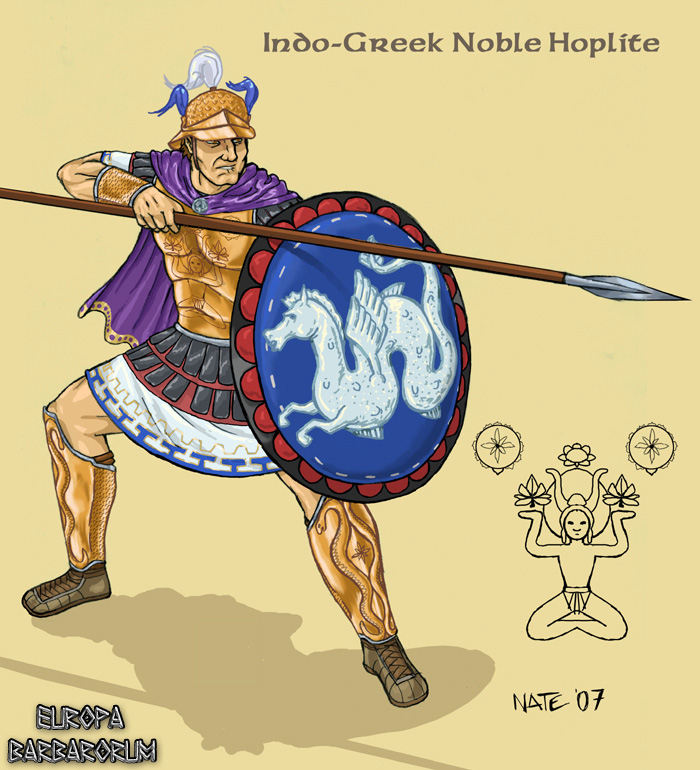IndoHellenikoi Eugeneis Hoplitai (IndoGreek Noble Hoplites) - approximately 150 BC

When the Baktrians settled in the lush valleys of Indus and its tributaries, they along with their subjects, the Kamboja, native Baktrians(Bahlikas), Kalasha, Pashtu and others became mesmerised with the wealth of the region, a wealth they were not used in their cold, muddy, mountainous counrty. Not long after they were settled, but not as mere colonists farming their steads, but as lords, officers, higher administrators, an elite of an emerging society who had the millions of Indus and Ganges plains farmers as its base. It must have been a paradise revisited, a dream on earth for the period of those 8 kings that the IndoGreek empire survived in. Yet, it wasn't for all. As in mainland Hellas, where it all began, only the firstborn inherited, and he would get everything. Everyone else were to fend for themselves. This was the law, and harsh as it might have been it was the reason why Hellenes had reached India. To make something out of their lives. To make a family, achieve the means to build a house to make a home in. Or at least, try to.
A Greek man in his home was a lord of his domain master of life and death to anyone living inside his house, provided he could keep them fed. But he, when the time came, would inherit it all to his first born, then cast the others out to seek a living. In the IndoGreek empire, that wasn't hard. There were always things needed doing and not enough Hellenes to do them. Most became administrators. A lot became horsemen, joining the heavy horse elites and Prodromoi units. Many became senior administrators, leaving the subjects from Baktria to fend for the minutia of running the state. Some became priests, be it in Artemis-Anakhita, Zeus-Mithra, Athena Alkidemos, even in the latest novelty, Bhikku in Buddhism. The infantry was neglected at that time as it was only the Baktrian subject races, or the newer Indian ones, which served there. The Hellenes were only officers there. Yet those officers knew. To make an infanrty and give it a will to fight you should always have a unit which will fight to the last man. A unit of either fanatics or extremely proffessional soldiers who have a lot to lose if the kingdom is lost. That unit,of men where eveyone else looks up to, but never in the eyes. Those were the IndoGreek Noble Hoplites. Born and raised in the newly created nobility of the IndoGreek realm, the Hellenes who had left Hellas centuries ago to colonize Alexandros' far flung conquests, the sons of farmers, herders and smiths. Now they were the elite, Nobility over tens of millions of river farmers. Yet they must have known how fragile their whole kingdom was both from both internal strife and external enemies. So they were very highly moralized, because they knew that they were the only ones fighting as foot soldiers with so much at stake. Should they lose, all the magnificent world of IndoGreek fusion that was being created, would crumble. They were made to believe that they stood guards of everything they loved.
Before Menander, they didn't exist. The Hellenes who invaded India were almost all on Horseback. Infantry was for their subjects only. It was thought that only cavalry could carry the day, or 10 times more infantry in a pinch. Yet in the siege of Baktra, the usurper Eukratides on a sally with 300 elite cataprhacts routed the IndoGreek kings' Demetrios II army, killing him in the process, and reaching Indos river, or as Justin would put it "Eucratides led many wars with great courage, and, while weakened by them, was put under siege by Demetrius, king of the Indians. He made numerous sorties, and managed to vanquish 60,000 enemies with 300 soldiers, and thus liberated after four months, he put India under his rule" Justin XLI,6 . Indian infantry would dissolve like a sandcastle. As Eukratides was doing this, he was threatening to destroy all the IndoGreeks had built. Menandros could only drive him back into the Khyber pass and that at the cost of abandoning the Eastern territories, Pataliputra among them. In order to counter the annoying tendency of the Indian infantry to route, elite units were created and dispersed among it, the most valuable and hardy of which were IndoHellenikoi Eugeneis Hoplitai.
Using them to bolster his infantry, Menandros became the greatest IndoGreek king. Armed with a bronze heavy hoplon shield, like their ancestors in Thermopylae centuries ago, and with a spear of the finest Iron tip their Indian subjects could muster, they were able to withstand attacks of everything in the battlefield, other than elephants. They wore an evolved boetian helmet, a bronze muscle cuirass with Indian themes engraved on, pterytes and perikneimides (full greaves) to complete their armor. Their secondary weapon, should their spear break was an evolved kopis, or Khukhri, as their Indian subjects called it, a medium sized sword of indian steel made for slashing. Those men may have been called Nobles as a unit, but in battle they were nothing short of Kings!
|



